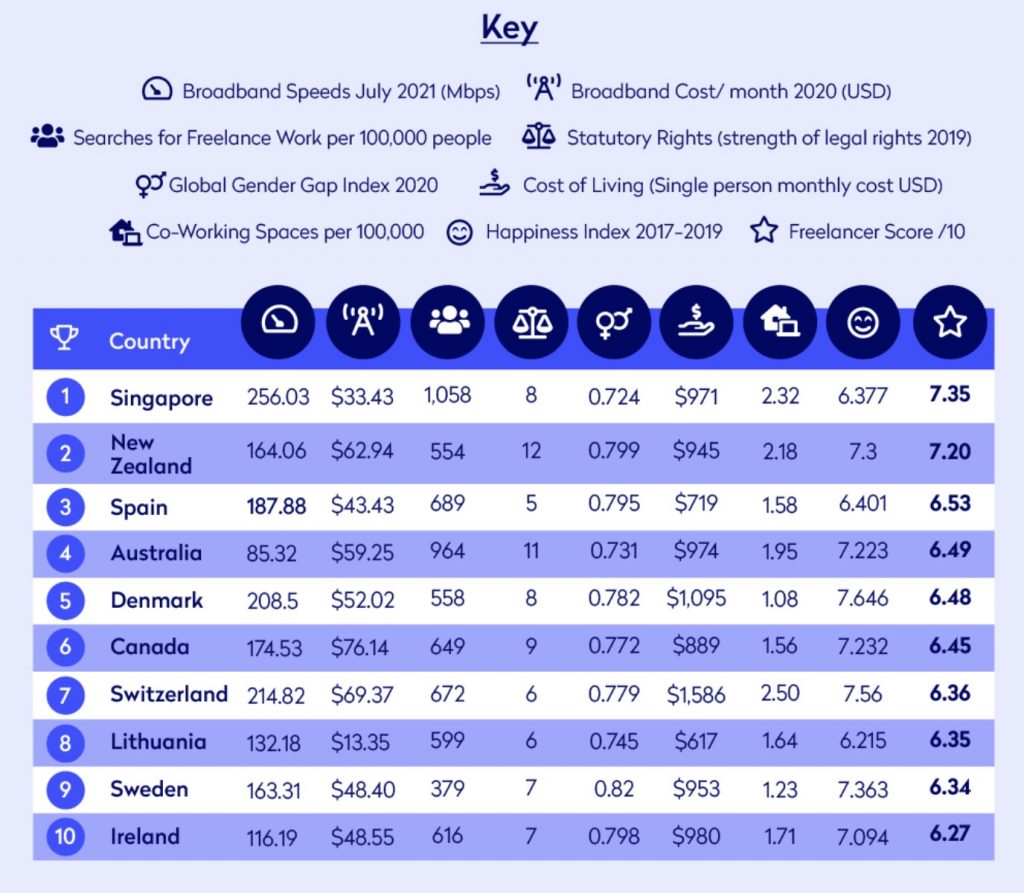Why in-demand freelancers are looking to Singapore and other countries to ply their trades

The first mention of “freelancers” can be found in Sir Walter Scott’s Ivanhoe, published in 1819, about an army of medieval mercenaries who would fight for whichever nation or person paid them the most. Not much has changed since, save for the lances being swapped for laptops and smartphones. Oh, and many freelancers can fight their 21st-century battles virtually, from anywhere on the planet.
By some estimates, there are 1.1 billion freelancers in the world — roughly 35% of the global workforce. But, in reality, it’s tricky to count them all, with one-person businesses, the self-employed, and “work on the side” all blurring the lines.
Regardless, current coronavirus-induced circumstances seem to have tipped the balance even further. Flexibility and agility in times of crisis are vital. Consider that freelancers contributed $1.2 billion to the U.S. economy in 2020, up 22% from the year before, according to a report from U.S. freelancing platform UpWork. And with the Great Resignation plus organizations seeking to accelerate their digital transformation journeys, spurred by the pandemic, the expertise of freelancers are business-critical, even if only used for a limited time.
The modern weapons wielded by freelancers means they can, theoretically, work from anywhere with a decent internet connection. According to a new study from Tide, a U.K. financial technology company offering mobile-first banking services for small and medium-sized enterprises, Singapore tops the list of desirable places for freelancers to operate. New Zealand, Spain, Australia, and Denmark make up the rest of the most favorable five destinations, while the U.S. and U.K. languish in 12th and 13th, respectively.
Singapore leads the way
“Freelancing is becoming more prevalent around the world as people want more flexibility and control over their working lives,” said Sarah Penney, community lead at Tide. So perhaps it’s no surprise that Singapore is the number-one choice, given its remarkable broadband speed of 256 megabits per second (the second-quickest is Switzerland with 215 megabits per second).
“Singapore came out on top of our study, mainly as the country benefits from excellent broadband that’s both affordable and super fast,” said Penney. “And it also has a high number of co-working spaces, thanks to the country’s attractive nature to startups,” she added, in reference to its well-known pro-business ecosystem and access to venture capital — all geared toward driving innovation and encouraging people to establish companies.
She noted that the country has relied on a single company to lay all its fiber optic connections, primarily funded through government grants. Singapore’s internet providers then have equal access to this network, creating a more competitive environment for consumers.
Meanwhile, second-placed New Zealand scored well for general happiness, which was measured by the quality of people’s lives during the pandemic and how its government responded to Covid-19, according to Penney.
Equality is also highly valued in New Zealand, which is a crucial point for freelancers, she said. “New Zealand’s gender pay gap narrowed to the smallest on record as the government pursues wage equity for women, an issue championed by prime minister Jacinda Ardern. The government has tried to close pay gaps by employing more women in leadership positions, eliminating gaps within the same roles, and increasing work flexibility to retain women,” she said.
Similarly, Spain ranked third in the research by dint of “its strong performance on the global gender pay gap index” while Australia scored highly due to the number of co-working spaces. Additionally, the country has robust legal protections for workers.
Denmark, fifth on Tide’s list, has several political initiatives that aim to provide nationwide fixed and mobile broadband coverage. “The government is working toward making the country a digital frontrunner by creating a foundation for Danish businesses to exploit digital technologies,” added Penney.
U.K. playing catch up
Andy Chamberlain, director of policy at the Association of Independent Professionals and the Self-Employed, fears the U.K. is becoming less appealing to digital nomads. “While the number of freelancers in countries like the U.S. has grown over the past year, self-employment here shrunk by 653,000 in 2021,” he said.
It is crucial to halt this slide, given it was estimated in 2019 by the Centre for Research on Self-Employment that the U.K.’s freelance community generates up to £145 billion ($192 billion) a year for the national economy — almost exactly the same as tourism.
Chamberlain believes there are two leading causes for the drop: the pandemic, and the recently introduced anti-avoidance tax legislation IR35, which requires organizations to make notoriously complex tax status decisions on behalf of freelancers.
“If the government is going to make the country a more attractive place for self-employed workers, then it is going to have to solve the confusion around IR35,” he said. “The reform has burdened thousands of freelancers with unfair taxes and has made it more difficult to make a living from self-employment.”
Until the U.K. reduces the complexity for freelancers, digital nomads are likely to favor other destinations. I hear Bondi Beach near Sydney, Australia is rather nice this time of year.

